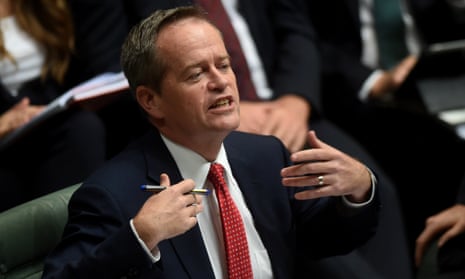The opposition has claimed victory over pension changes after the Abbott government split its welfare measures into separate bills to gain Senate approval for less controversial aspects.
The Labor leader, Bill Shorten, told parliament his party had prevailed over budget measures such as cutting the indexation of pensions and raising the retirement age to 70.
The social services minister, Kevin Andrews, introduced four new bills to parliament on Thursday morning.
They included a bill containing measures Labor has previously indicated it would support, such as reducing the primary earner income limit for family tax benefit part B from $150,000 to $100,000 and ceasing indexation of the clean energy supplement.
This bill passed the lower house with the support of Labor on Thursday morning, and therefore will easily clear the Senate without the need for crossbench negotiations.
The bill also contains a measure to remove relocation scholarship assistance for students relocating within and between major cities. The bill allows a review of disability support pension recipients aged under 35 against revised impairment tables.
But the government has moved other welfare measures into three other bills, including the widely opposed “earning or learning” proposal to strip unemployed people aged under 30 of income support for six months each year.
Other measures which still appear bound for Senate defeat include limiting family tax benefit part B to families with children under six years of age, cutting the pension indexation rate to the consumer price index from 2017, and increasing the pension age over time from 67 to 70.
Despite the restructuring of the bills in a clear acceptance of the Senate’s refusal to pass key aspects, Andrews focused on the passage of the first set of measures.
“Operation Budget Repair continued today,” Andrews said in Canberra.
In a triumphant speech to parliament, Shorten said pensioners had prevailed over Andrews and Tony Abbott for the time being, but vowed to campaign against the plans at the next election.
“Do not look at what this prime minister says; look at what he does,” Shorten said. “Make no mistake, this government wants to cut the indexation rate of pensions.”
Andrews said Shorten had accepted $2.7bn worth of savings proposed by the government, but was still “in denial about the state of the commonwealth finances that he left at the end of his term in office”.
Andrews said the other bills reintroduced on Thursday, including the age pension changes, would be subject to further consultations and negotiations with other Senate members.
He declined to comment on the progress of negotiations with crossbench senators including those from the Palmer United party.
Andrews indicated the stalled welfare measures would not be removed from the budget bottom line in the forthcoming mid-year economic and fiscal outlook, because the government was still committed to pursuing them in parliament.
He said the government remained committed to prosecuting all the measures it had outlined and “welfare reform is not something that happens overnight”.
Andrews would not comment on whether the government was prepared to fight for the measures at the next election, due in 2016.
“That’s two years away as far as I know,” he said. “I don’t know what will have passed by then.”
The Greens senator Rachel Siewert said the government had “not given up the ideological war against the most vulnerable people in our community”.
She said the measures contained in the government’s deal with Labor delivered “unacceptable” cuts.
The Welfare Rights Network said it hoped the Senate would “reject most of the extreme and harsh social security changes”.
“It is troubling, however, that the legislation under consideration may result in people receiving the Disability Support Pension under 35 being subjected to financial penalties for the first time,” said the network’s president, Maree O’Halloran.
“There is no evidence that this hardline approach helps people to find and keep employment.”
The advocacy group People with Disability Australia said it was “angered that budget saving measures will disproportionately impact people with disability yet again”.

Comments (…)
Sign in or create your Guardian account to join the discussion